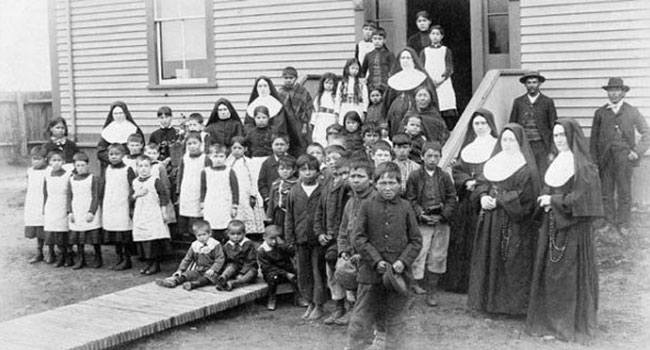 CBC reports that a class-action lawsuit against the federal government has been authorized on behalf of Indigenous students who attended day schools in Canada. It seeks damages for every Indigenous student who attended.
CBC reports that a class-action lawsuit against the federal government has been authorized on behalf of Indigenous students who attended day schools in Canada. It seeks damages for every Indigenous student who attended.
There are an estimated 100,000 such people alive. The lawsuit could result in a payout of at least the $5 billion that was paid to those who attended residential schools.
One former student is quoted as saying he wants compensation for the abuse done to him. He claims that this abuse consisted of forcing him to attend school, forcing him to learn in English, subjecting him to discipline, such as the strap, and denying him the right to learn in his native language.
Wait a minute!
This man’s complaints about his educational history perfectly describe my own public school education in the 1950s. I too was forced to attend school. The Public Schools Act saw to that. Before compulsory education came in, rich people’s children attended school and the poor didn’t. Compulsory education was a huge advancement that allowed western countries to progress at a hitherto unimaginable rate.
And yes, there were methods of discipline used in those schools that aren’t used today. In the very early years, caning was routine, but even in the 1950s the strap was regularly used in primary schools. I knew that strap quite well.
The use of those methods of discipline had nothing to do with the racial or ethnic background of the student at the receiving end.
The complaint about being forced to learn English also applies in my case. The teaching of English was considered to be very important. If my classmates – who came from a multitude of ethnic backgrounds in north Winnipeg – had communicated to each other in their ethnic languages, they would definitely have been told to speak English. It was one of the basic aims of the education system to have students learn to be as fluent in spoken English and as competent in written English as possible.
That aim has not changed – for very good reasons.
For that matter, parents of children in French immersion understand and agree with the prohibition on spoken English that will help their children learn French at a faster rate.
The complaint about not being taught his native language when he attended public school also applies to me. I never learned my ethnic language. My parents tried to interest me in learning it but like most kids of my age, I had no interest. It had little relevance for us.
It would have been impossible for public schools to teach it even if fluency in a native language had been an educational goal. There were simply too many ethnic languages involved to make this possible. It would also be impossible to tell what language to teach a child. This nation is a tangled combination of many ethnic groups.
This applies to Indigenous people as well. Not only are there more than 60 distinct Indigenous languages, virtually all Indigenous people are also Scottish, Irish, English, etc., just as most non-Indigenous Canadians have many ethnicities in their DNA.
However, even if publicly-funded schools could teach ethnic languages, this would have been regarded as a rather esoteric pursuit that ran counter to what schools were meant to do. In my neighbourhood, many older people couldn’t speak English well or at all. Teaching English was seen as a way to allow the children of these people to have a better chance at succeeding in a modern world than did their Yiddish, Ukrainian or Cree-speaking parents and grandparents. English was the key to a better life.
And that education worked.
So although I have basically the same educational history as the man who’s suing the government, I’m deeply thankful for the education I received. He, however, sees it as an abuse that should entitle him to a large cash reward.
This is not meant to trivialize people who suffered real abuse. They are entitled to compensation.
But if past history with the current federal government is any guide, this lawsuit will never reach the courts. It will be settled and every qualifying person will be lavishly compensated without the need to prove his or her case.
That’s exactly what happened with former residential school students. They each received $10,000 for simply having attended a school and $3,000 for every year they spent there. And the people who actually proved damages received a lot more.
The people who got good educations that they would not otherwise have received were compensated along with people who were mistreated.
This is also what happened in the case of the ’60s Scoop. Without having to prove a thing, the government stepped in and promised to pay each such person involved $35,000. Even people who were rescued from awful homes and raised in good ones received the money.
This is also what’s likely to happen in the case of the missing and murdered Indigenous women. At some point, the families of these unfortunate women will receive a huge cheque. This will even include families that the missing women were forced to flee for their own protection.
The lawsuit will be a gold mine for the estimated 100,000 people. But it will represent another kick in the teeth to struggling taxpayers forced to pay yet more billions to the federal government’s favoured special interest groups, while basic services go wanting.
The man who complains about abuse is right – but the real abuse here is to the taxpayer.
Brian Giesbrecht is a retired judge and senior fellow with Frontier Centre for Public Policy.
The views, opinions and positions expressed by columnists and contributors are the author’s alone. They do not inherently or expressly reflect the views, opinions and/or positions of our publication.
This site is Powered by Troy Media Digital Solutions


